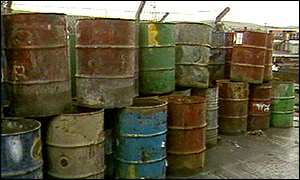
Attorneys general in 12 states said Friday that the Bush administration's plan to ease rules on reporting legal toxin releases would compromise the public's right to know about possible health risks in their neighborhoods. In a letter to the EPA, the state officials say the proposals, which include raising some reporting thresholds and moving from annual to biennial reports, would have the greatest harm in low-income neighborhoods where polluting facilities are often located.
The Bush administration proposed the changes in September. as a way to reduce the regulatory burden on companies when they report their pollution to the EPA's Toxic Release Inventory Program.
 "This EPA move appears to be yet another poorly considered notion to appease a few polluting constituents at the expense of a valuable program," New York Attorney General Eliot Spitzer said.
"This EPA move appears to be yet another poorly considered notion to appease a few polluting constituents at the expense of a valuable program," New York Attorney General Eliot Spitzer said. Also signing the letter were the attorneys general of California, Connecticut, Illinois, Iowa, Maryland, Massachusetts, New Hampshire, New Jersey, New Mexico, Vermont and Wisconsin. All are Democrats except Republican Kelly Ayotte of New Hampshire.
"The public has a fundamental right to know what hazardous materials their children and families are being exposed to," said Wisconsin Attorney General Peggy Lautenschlager.
The proposed changes, which require congressional approval, would exempt companies from disclosing their toxic pollution on the long form if they claim to release fewer than 5,000 pounds of a specific chemical -- the current limit is 500 pounds -- or if they store it onsite but claim to release "zero" amounts of the worst pollutants. The chemicals involved include mercury, DDT, PCBs and other chemicals that persist in the environment and work up the food chain. Companies must report any storage of dioxin or dioxin-like compounds, even if none are released.
The inventory program began under a 1986 community right-to-know law. If Congress agrees, the first year the changes could be possible would be 2008. EPA officials say communities will still know about the types of toxic releases, but not some details about how each chemical was managed or released.
Source: Associated Press
No comments:
Post a Comment